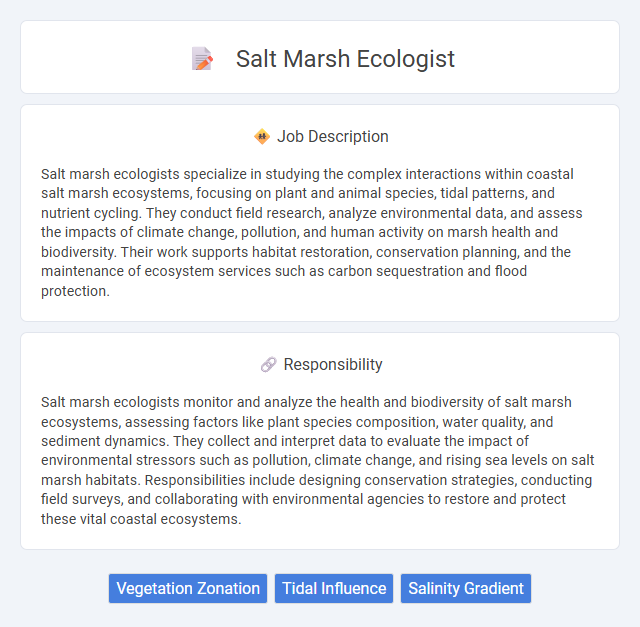
Salt marsh ecologists specialize in studying the complex interactions within coastal salt marsh ecosystems, focusing on plant and animal species, tidal patterns, and nutrient cycling. They conduct field research, analyze environmental data, and assess the impacts of climate change, pollution, and human activity on marsh health and biodiversity. Their work supports habitat restoration, conservation planning, and the maintenance of ecosystem services such as carbon sequestration and flood protection.
Individuals with a passion for coastal ecosystems and strong observational skills are likely to find a salt marsh ecologist role fulfilling. Those comfortable with outdoor fieldwork, variable weather conditions, and detailed data collection may be well-suited to the physical and mental demands of this position. Candidates lacking enthusiasm for environmental science or the unpredictability of field conditions might find this career less compatible with their preferences.
Qualification
Salt marsh ecologists typically require a bachelor's degree in ecology, environmental science, biology, or a related field, with many positions favoring a master's or doctoral degree for advanced research roles. Proficiency in fieldwork techniques, GIS mapping, and data analysis software such as R or Python is essential for studying salt marsh ecosystems and monitoring their health. Strong knowledge of coastal ecology, wetland restoration, and experience with environmental impact assessments are critical qualifications for securing roles in academic, governmental, or conservation organizations.
Responsibility
Salt marsh ecologists monitor and analyze the health and biodiversity of salt marsh ecosystems, assessing factors like plant species composition, water quality, and sediment dynamics. They collect and interpret data to evaluate the impact of environmental stressors such as pollution, climate change, and rising sea levels on salt marsh habitats. Responsibilities include designing conservation strategies, conducting field surveys, and collaborating with environmental agencies to restore and protect these vital coastal ecosystems.
Benefit
A salt marsh ecologist likely benefits from contributing valuable insights into coastal ecosystem health and resilience, which may help guide conservation efforts and policy decisions. This role probably involves hands-on fieldwork that can enhance practical skills and offer unique opportunities for scientific discovery. The job may also provide collaboration with diverse teams, fostering professional growth and expanding expertise in environmental science.
Challenge
Salt marsh ecologist jobs likely involve navigating complex environmental challenges such as fluctuating tides, saltwater intrusion, and habitat degradation. The role may require managing the delicate balance between conserving biodiversity and addressing the impacts of climate change. Researchers in this field probably need to develop adaptive strategies to protect these ecosystems while accommodating human activities.
Career Advancement
Salt marsh ecologists specializing in coastal ecosystem research can advance their careers by gaining expertise in habitat restoration techniques and climate change impact assessments. Progression often involves securing leadership roles in environmental consulting firms, governmental agencies, or academic research projects focused on conservation biology and ecosystem management. Developing skills in GIS mapping, data analysis, and policy advocacy enhances opportunities for senior positions and influential contributions to salt marsh preservation initiatives.
Key Terms
Vegetation Zonation
Salt marsh ecologists specializing in vegetation zonation study the distribution patterns of plant species across tidal gradients, crucial for understanding ecosystem health and resilience. They analyze factors such as salinity, tidal inundation, and sediment deposition that influence the spatial arrangement of marsh vegetation, informing conservation and restoration efforts. Expertise in identifying dominant halophytic species and their zonation boundaries enables accurate assessment of habitat changes due to climate impacts and human activities.
Tidal Influence
Salt marsh ecologists study the dynamic interactions between tidal patterns and salt marsh ecosystems, analyzing how tidal fluctuations influence vegetation zones, sediment deposition, and nutrient cycling. They monitor tidal inundation frequencies to assess impacts on plant species distribution and habitat resilience against sea-level rise. Understanding tidal influence is crucial for predicting ecological responses to climate change and guiding effective coastal conservation strategies.
Salinity Gradient
A salt marsh ecologist specializing in salinity gradients studies the variation in salt concentration across tidal zones and its impact on plant and animal communities. This research informs habitat conservation and restoration by analyzing how changing salinity levels influence species distribution and ecosystem health. Understanding salinity gradients is crucial for predicting the effects of climate change and sea-level rise on salt marsh resilience and biodiversity.
 kuljobs.com
kuljobs.com